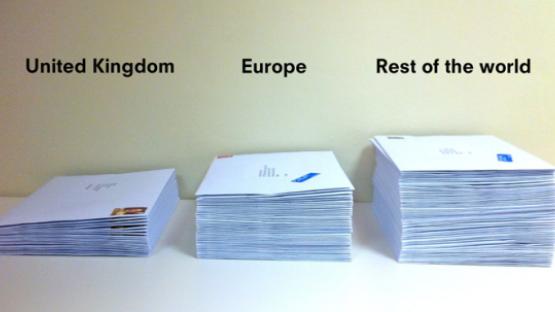Do surveillance companies care about human rights?

On Friday, we wrote to 140 companies around the world that are known to be selling surveillance technology, to ask them a series of questions. We wanted to know whether or not companies conducted human rights due diligence when dealing with foreign companies or governments, how many of them were doing business or seeking to do business with 'Not Free' countries (as categorised by Freedom House's latest report), and whether any of them would be interested in meeting with us to discuss their human rights policies.
When we first compiled the ‘Big Brother Incorporated’ list in partnership with the Bureau of Investigative Journalism back in November, we’d remarked on the significant number of companies based in the United States and the United Kingdom. However, it was only when we started stacking up the envelopes to take to the post office that we realized just how disproportionately Britain was represented.
There were 21 British companies on our list – as many as the Chinese, Russian, Canadian, Indian and Israeli companies combined. The US topped the list with 48 companies, meaning that over a third of the companies we contacted were American, and Germany took third place with 12 companies. There were very few companies based in countries where the use of surveillance technology has raised human rights concerns, like Egypt, Colombia and the UAE.
The statistics go some way to confirming our suspicions about how the international surveillance trade works - repressive regimes tend to buy equipment and software from the US and from certain European countries, where the industry is more sophisticated and prolific, rather than manufacturing it domestically. This means that any action taken by the US, UK or German governments to control exports of surveillance technology would have a significant impact in terms of limiting the kinds of equipment repressive regimes would be able to get their hands on.
However, exports from the UK are currently almost completely unregulated. This means that the task of deciding whether or not a foreign body should be allowed to purchase potentially lethal surveillance technologies is left entirely up to the companies. The Second Principle of the United Nations Global Compact (a UN initiative to encourage businesses to adopt socially responsible policies) states that businesses should ensure that they are not complicit in human rights abuses and have human rights policies in place, but there is no legal obligation to do so. We are campaigning for changes to export regimes in the UK and Europe, but in the meantime we need to find out what actions are being taken at the corporate level to prevent surveillance technologies falling into the wrong hands. We await responses from the companies...



